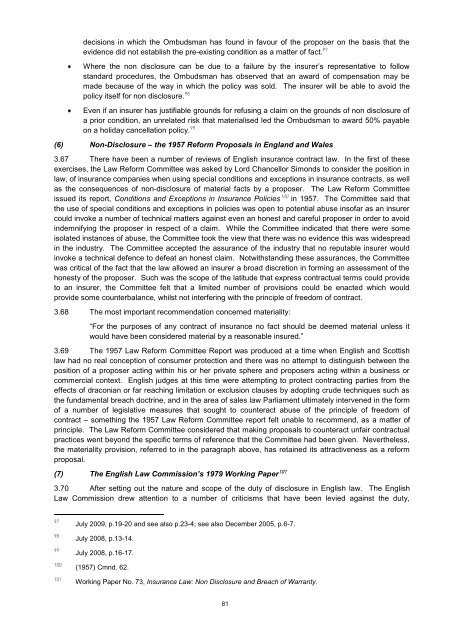Insurance Contracts CP - Law Reform Commission
Insurance Contracts CP - Law Reform Commission
Insurance Contracts CP - Law Reform Commission
Create successful ePaper yourself
Turn your PDF publications into a flip-book with our unique Google optimized e-Paper software.
decisions in which the Ombudsman has found in favour of the proposer on the basis that the<br />
evidence did not establish the pre-existing condition as a matter of fact. 97<br />
Where the non disclosure can be due to a failure by the insurer‘s representative to follow<br />
standard procedures, the Ombudsman has observed that an award of compensation may be<br />
made because of the way in which the policy was sold. The insurer will be able to avoid the<br />
policy itself for non disclosure. 98<br />
Even if an insurer has justifiable grounds for refusing a claim on the grounds of non disclosure of<br />
a prior condition, an unrelated risk that materialised led the Ombudsman to award 50% payable<br />
on a holiday cancellation policy. 99<br />
(6) Non-Disclosure – the 1957 <strong>Reform</strong> Proposals in England and Wales<br />
3.67 There have been a number of reviews of English insurance contract law. In the first of these<br />
exercises, the <strong>Law</strong> <strong>Reform</strong> Committee was asked by Lord Chancellor Simonds to consider the position in<br />
law, of insurance companies when using special conditions and exceptions in insurance contracts, as well<br />
as the consequences of non-disclosure of material facts by a proposer. The <strong>Law</strong> <strong>Reform</strong> Committee<br />
issued its report, Conditions and Exceptions in <strong>Insurance</strong> Policies 100 in 1957. The Committee said that<br />
the use of special conditions and exceptions in policies was open to potential abuse insofar as an insurer<br />
could invoke a number of technical matters against even an honest and careful proposer in order to avoid<br />
indemnifying the proposer in respect of a claim. While the Committee indicated that there were some<br />
isolated instances of abuse, the Committee took the view that there was no evidence this was widespread<br />
in the industry. The Committee accepted the assurance of the industry that no reputable insurer would<br />
invoke a technical defence to defeat an honest claim. Notwithstanding these assurances, the Committee<br />
was critical of the fact that the law allowed an insurer a broad discretion in forming an assessment of the<br />
honesty of the proposer. Such was the scope of the latitude that express contractual terms could provide<br />
to an insurer, the Committee felt that a limited number of provisions could be enacted which would<br />
provide some counterbalance, whilst not interfering with the principle of freedom of contract.<br />
3.68 The most important recommendation concerned materiality:<br />
―For the purposes of any contract of insurance no fact should be deemed material unless it<br />
would have been considered material by a reasonable insured.‖<br />
3.69 The 1957 <strong>Law</strong> <strong>Reform</strong> Committee Report was produced at a time when English and Scottish<br />
law had no real conception of consumer protection and there was no attempt to distinguish between the<br />
position of a proposer acting within his or her private sphere and proposers acting within a business or<br />
commercial context. English judges at this time were attempting to protect contracting parties from the<br />
effects of draconian or far reaching limitation or exclusion clauses by adopting crude techniques such as<br />
the fundamental breach doctrine, and in the area of sales law Parliament ultimately intervened in the form<br />
of a number of legislative measures that sought to counteract abuse of the principle of freedom of<br />
contract – something the 1957 <strong>Law</strong> <strong>Reform</strong> Committee report felt unable to recommend, as a matter of<br />
principle. The <strong>Law</strong> <strong>Reform</strong> Committee considered that making proposals to counteract unfair contractual<br />
practices went beyond the specific terms of reference that the Committee had been given. Nevertheless,<br />
the materiality provision, referred to in the paragraph above, has retained its attractiveness as a reform<br />
proposal.<br />
(7) The English <strong>Law</strong> <strong>Commission</strong>’s 1979 Working Paper 101<br />
3.70 After setting out the nature and scope of the duty of disclosure in English law. The English<br />
<strong>Law</strong> <strong>Commission</strong> drew attention to a number of criticisms that have been levied against the duty,<br />
97<br />
98<br />
99<br />
100<br />
101<br />
July 2009, p.19-20 and see also p.23-4; see also December 2005, p.6-7.<br />
July 2008, p.13-14.<br />
July 2008, p.16-17.<br />
(1957) Cmnd. 62.<br />
Working Paper No. 73, <strong>Insurance</strong> <strong>Law</strong>: Non Disclosure and Breach of Warranty.<br />
81

















